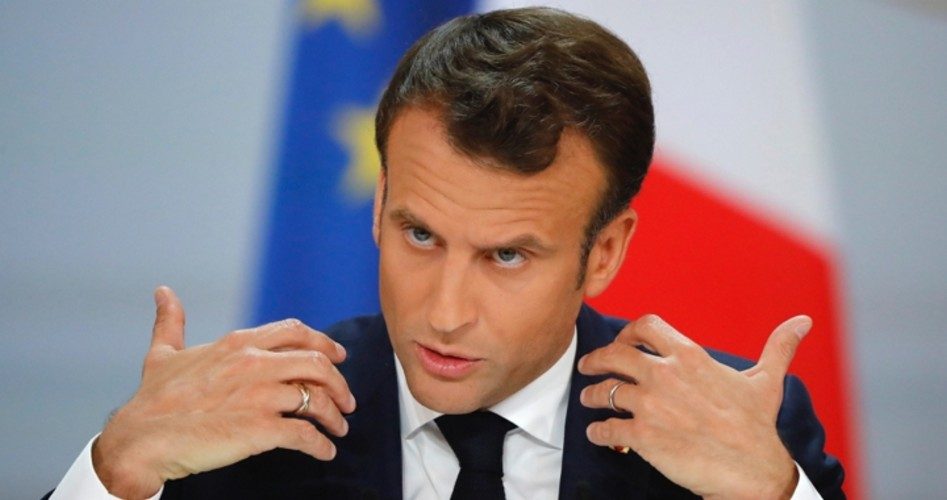
In the first major public news conference since his presidency began in 2017, French President Emmanuel Macron announced tax cuts and other government reforms to a French populace which has grown increasingly mistrustful of the once popular leader.
Since November of last year, Macron’s presidency has been haunted by large scale protests by the Yellow Vest movement. Those protests began over burdensome fuel taxes intended to combat alleged man-made climate change but quickly evolved into a more general indictment of French elites and Macron himself.
“I want (tax) cuts for people who work by significantly reducing income taxes,” Macron said Thursday.
The new tax cuts are said to be worth €5 billion and will reportedly be financed by eliminating corporate tax breaks and reductions in public spending. The new measures come on top of a package of tax cuts and income top-ups worth €10 billion, announced in December after the Yellow Vest protests were just weeks old.
In a controversial twist, Macron also suggested that the French workforce may have to put in longer hours in the coming years. “When I look at us compared with our European neighbors, we work less during the week and less during the year,” he said.
Macron called his speech the beginning of “Act 2” of his five-year presidential term. The effect of Macron’s announcements was somewhat diminished due to press leaks about some specifics contained in the speech. The speech was previously postponed because of the Notre Dame cathedral fire almost two weeks ago.
Macron also announced that he intends to scrap the prestigious Ecole Nationale d’Administration (ENA), an elite university founded by Charles de Gaulle in 1945, which Macron himself attended. The school is seen in France as a factory for creating elites in both government and the private sector — the kind of elites that the Yellow Vests are in a metaphorical war against. Macron himself is the fourth French president to have graduated from the university. Macron followed in the footsteps of Valẽry Giscard d’Estaing, Jacques Chirac, and Francois Hollande. Current Prime Minister Edouard Phillipe is also a graduate of the school.
Macron also acknowledged the citizens in rural France provinces who feel neglected by what they feel is a “Paris-centered” national government. He recalled his experiences earlier this year in the “Grand National Debate,” Macron’s tour of the country to listen to the grievances of ordinary French citizens.
“I learned a lot,” Macron said. “There are too many people in Paris who make decisions without knowing what the situation is like on the ground.”
To address some of those concerns, Macron announced a proposal to reduce the number of parliamentarians by up to 30 percent, while introducing a measure of proportional representation in elections to the National Assembly by up to 20 percent. This would give French provinces more of a say in the national government, which is currently dominated by Paris and its surrounding area.
Macron suggested that the current immigration policies, much of them crammed down France’s throat by the European Union, are not working. He specifically mentioned the Schengen Zone, an area comprised of 26 European states that have abolished passports and border controls along their mutual borders. Currently, the Schengen Zone includes Germany, Spain, Greece, Poland, Italy, and France along with many smaller countries.
Never mind that Macron is a globalist who likes open borders. A rival party, the Rassemblement National Party, fronted by Marine Le Pen whom Macron defeated for the presidency in 2017, is gaining in the polls and EU elections are just three short weeks away. Thus, Macron must act like he doesn’t like open borders.
“This wonderful Schengen Zone — it no longer works,” Macron said while suggesting that after combating “climate-change,” immigration is the next priority that France must tackle. Macron promised to “completely reform immigration policy.”
Macron also defended his first two years in office, claiming that, despite all of the protests, a lot of progress has been made in France. “Should we stop everything we did the last two years? Did we go the wrong way? I think totally the opposite.”
Prominent Yellow Vest activist Maxime Nicolle wasn’t impressed with Macron’s words. “He has not listened to what we have been saying in the street the last five months,” Nicolle told AFP. “We understand now that he is incapable of a mea culpa.”
Macron swept to power in 2017 with voters seeing him as a young fresh voice with new ideas and vigor. But thus far, it’s been the same old globalist policies leavened with elitism and a deaf ear to his citizens. The coming EU elections in May will be a referendum on him and his policies and rhetoric. And right now, with an approval rating of 30 percent, his future doesn’t look very bright.
Photo of French President Emmanuel Macron: AP Images




